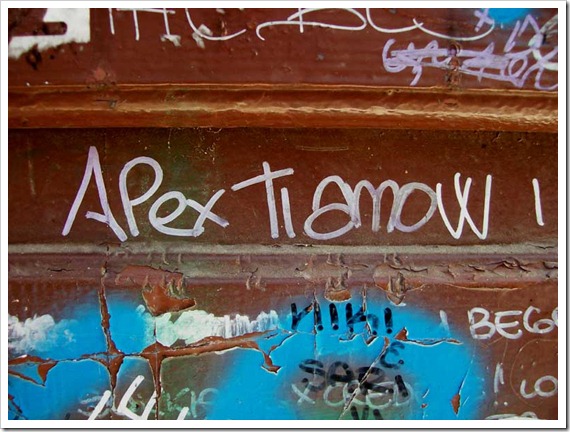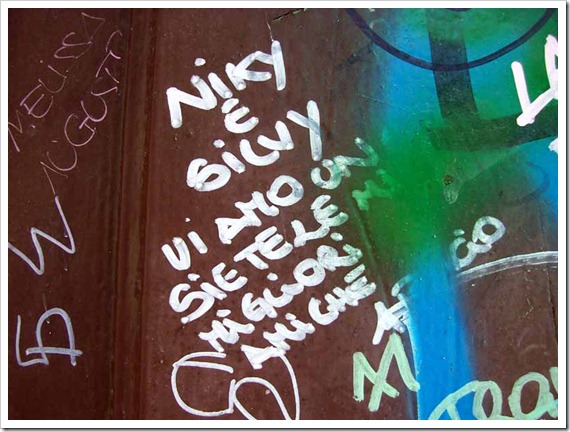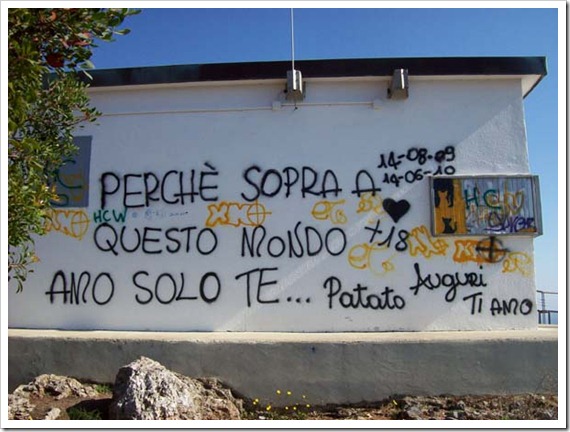How to say ‘I love you’ in Italian Posted by Serena on Oct 24, 2011 in Italian Language
Apparently one of the most frequently asked questions on internet search engines is ‘how do you say “I love you” in Italian… or Spanish, or German, or Greek, etc. etc. Well, this must be good news for international relations, and it’s certainly a lovely antidote to all the scaremongering perpetrated by politicians and the media who would have us believe that the world is full of nothing but terrorism, crime, hatred, murder, and misery. Wake up media managers and politicians, what people really want to know is how to say “I LOVE YOU” to foreigners!!
In Italy we are famous for being open with our sentiments. Just study the graffiti!
Here we have the answer to the question ‘how do you say “I love you” in Italian?’, or at least part of it, as we shall see. The message in the photo says ‘Alex ti amo’ = ‘I love you Alex’, and is composed of ti = ‘you’ (familiar) and amo = ‘I love’, the first person singular of the verb amare = ‘to love’. Let’s have a look at how to say I love you to more than one person at a time:
‘NICKY E SILVY VI AMO UN [SACCO] SIETE LE MIE MIGLIORI AMICHE’ = ‘Nicky and Silvy I love you a lot, you are my best friends’. Here we have: vi = you (plural) and amo = ‘I love’
If you want to tell someone that you really love them, or love them a lot you could say: Ti amo troppo = I love you too much. You could also say ti amo tanto, or, as in the photo above, ti amo un sacco = I love you a lot. I recently saw an impressive declaration of love written along about 10 meters of metal guard rail which read: ti amo tanto tanto tanto tanto tanto tanto tanto etc. = I really really really really really really really really love you. (unfortunately I couldn’t fit it all into a photo!)
I’ve become quite fascinated with, and touched by some of the romantic graffiti that I’ve read here in Italy. Here are some of my favourites:
“Un anno fa c’eravamo promessi di sposarci, è passato un anno e abbiamo mantenuto la promessa – Barbara e Sergio X sempre!!” = “A year ago we promised that we would marry each other, a year has passed and we have kept that promise – Barbara and Sergio 4 ever!!” (written on a building wall in Montemarcello)
“Laura ti adoro, 6 (shorthand for ‘sei’) la mia stella più bella” = “Laura I adore you, you are my most beautiful star” (found on a toilet door in Sarzana)
and this one that I photographed on the Ligurian coast
“BECAUSE IN THE WHOLE WORLD I LOVE ONLY YOU… Patato best wishes I LOVE YOU”. (Patato/a = Potato, is often used as an affectionate nickname)
However, whereas in English the word love is used in any situation where we have a strong emotional bond with someone, in Italian we differentiate between romantic and non-romantic love. Ti amo is how we say I love you to someone that we are ‘in love with’ romantically, but for friends, family, and animals we use volere bene a qualcuno = ‘to love someone in a non romantic way’, literally ‘to want well for someone’. Here is how we use it:
ti voglio bene = I love/really care for you
vi voglio bene = I love/really care for you (plural)
voglio bene a mia sorella = I love/really care for my sister
Note that as with ti amo, you can add tanto = ‘very much/a lot’ to this expression:
ti voglio tanto bene = I really care for you a lot
If you want to text this message to someone you can abbreviate it to TVB = ti voglio bene, or TVTB = ti voglio tanto bene
Remember that although it is fairly common to use the expression volere bene with someone that you are romantically in love with, the opposite rule does not apply, i.e. we never use ti amo for non-romantic relationships. If, on the other hand, you want to say ‘I love something’ you would say ‘adoro il gelato’ = I love ice-cream, adoro la musica di Lacuna Coil = I love Lacuna Coil’s music, etc.
Text and photos by Geoff
If you are interested in learning how to say i love you in Italian, you can hear it said by a native speaker here.

Build vocabulary, practice pronunciation, and more with Transparent Language Online. Available anytime, anywhere, on any device.







Comments:
William Auge:
Salve Serena,
“ti amo” e’ una frase italiana io dico spesso a mia moglie. Grazie per un megliore comprensione di come a esprimere i miei sentimenti.
auguri, William
Tina:
Thanks for clarifying! I have made errors in the past & have only now been figuring these differences out! I didn’t know how to express, “I love pizza!”, now I do. Grazie mille! Ciao!
Carol Isles:
In the second photo, it looks as if “vi amo” was used among girlfriends, non “vi voglio bene”. This seems inconsistent with the rule that “ti amo” isn’t used with friends but only with someone we are in love with romantically … ?
Serena:
@Carol Isles Salve Carol,
If you are studying Italian you will probably have noticed by now that every rule has at least one exception. I explained that we don’t use ‘ti amo’ in a non romantic relationship for the sake of foreigners who are learning Italian. In that way they don’t get themselves into embarrassing situations by telling friends or family that they are ‘in love with’ them. However, the graffitti was written by teenagers and, although not strictly correct, it seems to express the kind of relationships that kids of that age often have with their peers.
10 out of 10 for spotting the anomaly!
Saluti da Geoff
andreas:
Salve Serena e Geoff!
E’ molto commovente e toccante che la gente non abbia dimenticato la cosa piu’ importante nella vita.
E grazie a questo blog gia’ voglio tanto bene a Serena e i miei migliori saluti a Geoff.
Andreas
Eric Anderson:
Been reading this blog for a while and really enjoyed this article. Practical language notes about love from graffiti. A well written article.
Vince:
Hi Serena:
Interesting. When I was in Croatia they said, “Volim te’ or “Ja te volim” for “I love you.”
Also, the Italian workers I knew in Italy would call the Germans, who they did not like, ‘potatoes’ but in German, Kartoffel. It seems ‘potato’ can be a term of endearment and a term of less than endearment.
Vince
Vince:
Hi Serena:
Interesting. When I was in Croatia they said, “Volim te’ or “Ja te volim” for “I love you.”
Also, the Italian workers I knew in Italy would call the Germans, who they did not like, ‘potatoes’ but in German, Kartoffel. It seems ‘potato’ can be a term of endearment and a term of less than endearment.
Vince
Eli:
Thanks for the detailed clarification